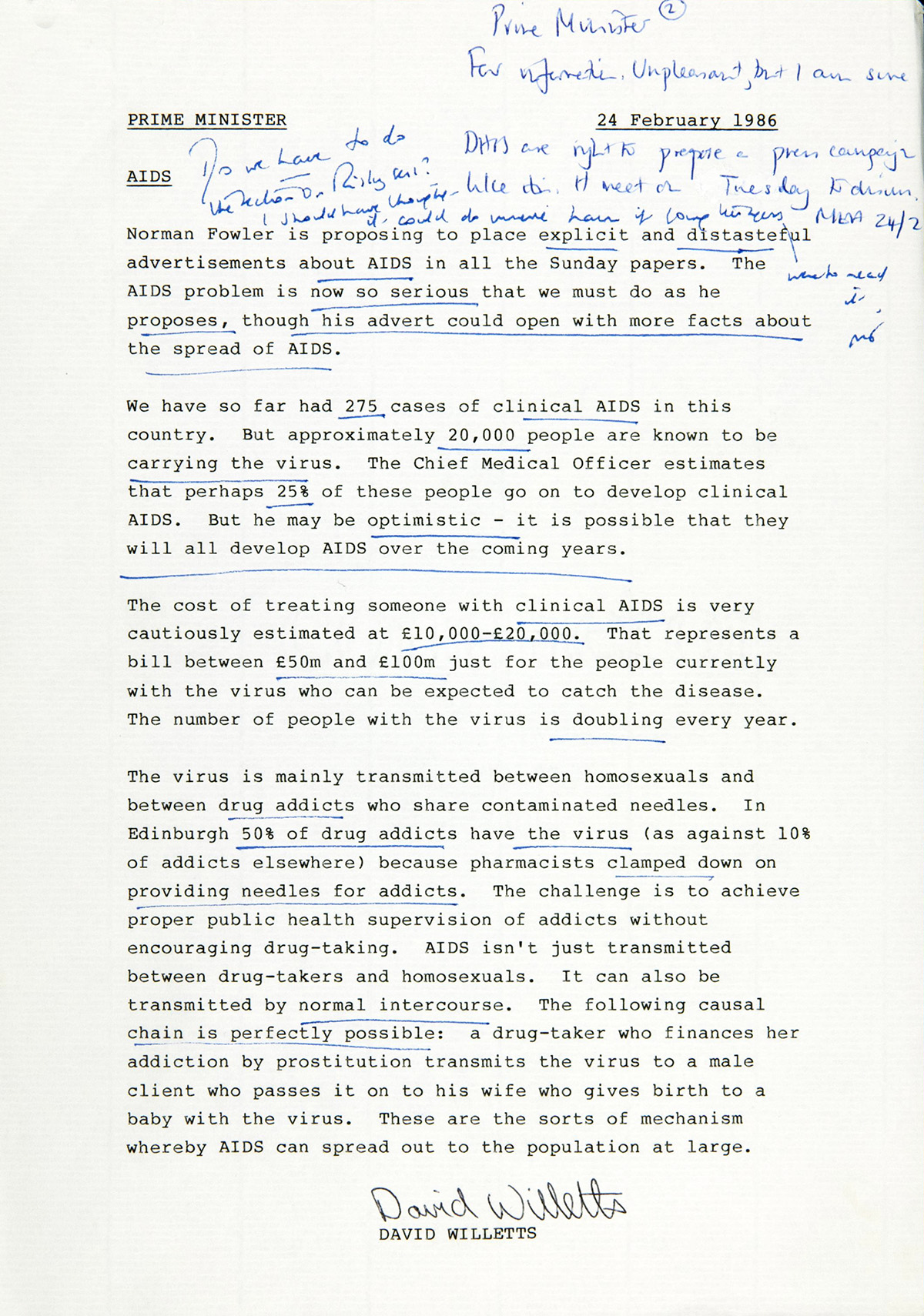
1986: Letter to Margaret Thatcher, then-Prime Minister, about the AIDS government health campaign, 24 February. From David Willetts of the Policy Unit. Catalogue ref: PREM 19/1863
This letter was written during the height of the HIV/AIDS epidemic in Britain during the 1980s. HIV/AIDS is a disease mainly spread through unprotected sexual contact. When the disease was first reported on in the 1980s, little was known about how to treat it and it was extremely dangerous for the people who caught it. A lack of sexual education for LGBTQ+ people contributed to AIDS mainly affecting men who had sex with other men.
By the mid-1980s in the UK, the AIDS epidemic had grown so severe that the government launched campaigns that aimed to educate the public about the disease, many of which are still widely remembered.
Transcript
[Handwriting of a Private Secretary]:
Prime Minister
For information. Unpleasant, but I am sure DHSS are right to propose a press campaign like this. H meet on Tuesday to discuss. MEA 24/2
[DHSS = Department of Health and Social Security, H = Home Affairs Cabinet Committee]
[Thatcher’s handwriting]:
Do we have to do the section on risky sex? I should have thought it could do immense harm if young teenagers were to read it.
[Printed]:
PRIME MINISTER 24 February 1986
AIDS
Norman Fowler is proposing to place explicit and distasteful advertisements about AIDS in all the Sunday papers. The AIDS problem is now so serious that we must do as he proposes, though his advert could open with more facts about the spread of AIDS.
We have so far had 275 cases of clinical AIDS in this country. But approximately 20,000 people are known to be carrying the virus. The Chief Medical Officer estimates that perhaps 25% of these people go on to develop clinical AIDS. But he may be optimistic – it is possible that they will all develop AIDS over the coming years.
The cost of treating someone with clinical AIDS is very cautiously estimated at £10,000-£20,000. That represents a bill between £50m and £100m just for the people currently with the virus who can be expected to catch the disease. The number of people with the virus is doubling every year.
The virus is mainly transmitted between homosexuals and between drug addicts who share drug contaminated needles. In Edinburgh 50% of drug addicts have the virus (as against 10% of addicts elsewhere) because pharmacists clamped down on providing needles for addicts. The challenge is to achieve proper public health supervision of addicts without encouraging drug-taking. AIDS isn’t just transmitted between drug-takers and homosexuals. It can also be transmitted by normal intercourse. The following causal chain is perfectly possible: a drug-taker who finances her addiction by prostitution transmits the virus to a male client who passes it on to his wife who gives birth to a baby with the virus. These are the sorts of mechanisms whereby AIDS can spread out to the population at large.
DAVID WILLETTS
- Why was the government preparing a major AIDS awareness campaign in 1986? Suggest at least three reasons.
- Why do you think one of the handwritten notes uses the word ‘unpleasant’ in reference to the campaign?
- What does then-Prime Minister Margaret Thatcher’s response tell you about the concerns that the government had about a campaign like this?
